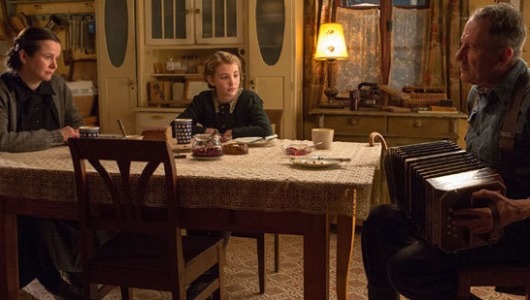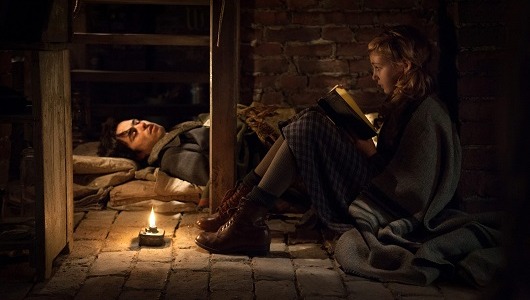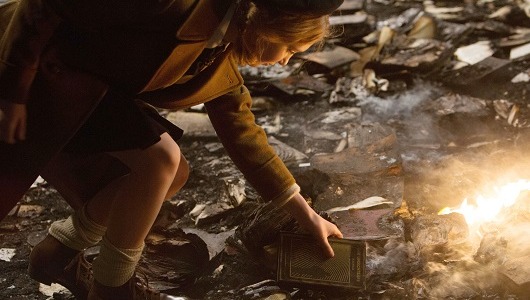Numerous films have been made surrounding the emotional cost of the Second World War. Different perspectives aid our insight; those from a child can be powerful through the air of innocence that resonates within the context of a regime that is the complete opposite.
• Director: Brian Percival
• Exhibition: 2D
• Rating: 12A
• Run Time: 131 mins

Unfortunately, The Book Thief does not translate nearly as well as other similar titles, such as The Boy in the Striped Pajamas; something I can grasp without having read the whole book yet. perhaps it’s a result of an unusual narrator – the Angel of Death – who’s total presence from the start of the novel and fitting role seems odd and lacking in gravity in the film, his interjection at points in the story much less atmospheric. His intrigue in human nature, particularly Liesel’s nature of surviving, lacks the same impact it has in the novel, despite the character being well-voiced by Roger Allam. There are a number of elements that are lacking, transforming this story into something much more glossy, gimmicky and extremely dramatised.

The Book Thief focuses on the trials of a girl named Liesel, a child of communist parents who is being sent to the care of a German couple, presumably for protection (and perhaps, re-education). The cruelty of her experience is outlined from the start with the unexpected death of her younger brother, leaving her isolated physically and emotionally upon her arrival at Heaven Street, the home of the Hubermann’s.
Unfortunately, distraction is taken from the greatly-fitting stark cinematography due to the nature of the script-writing that acts as The Book Thief‘s biggest let-down. The narrative feels disjointed partly in fitting with the childlike perspective the film takes; it is marked by certain key events that impact her life and of those most important to her. Her journey is made up of travels through the world of reading and writing, and this powerful medium is focused on positively in showing its significance in maintaining joy and offering comfort to anyone. However, the symbolism of this idea is utterly deflated by the interactions between the characters themselves. The film progress towards focusing on the relationship between Liesel and a young boy named Rudy, a persistent and energetic character that is redeemed by his likeability and the simplicity their relationship brings to the sombre background of war. Yet their behaviour towards each other descends into depths that are utterly unrealistic and ill-fitting to the behaviour of children.

Similarly, there is a strong bond developed between Liesel and a Jewish young man named Max, who fled his home after the events of Kristallnacht (the Night of Broken Glass) and seeking Hans Hubermann, a friend to his father, the original owner of the accordion Hans faithfully plays. Their illegal harbouring of a Jewish man coupled with Liesel’s adoration for reading ties them together in an illicit yet genuine friendship that begins heart-warmingly, albeit clichéd. Unfortunately, this tips in the wrong direction, and the potential importance The Book Thief could convey about Nazi intolerance is completely overshadowed, as more room is made for wince-inducing, sappy dialogue. Much of the events happen as convenience to a story that seems intent in dwelling on dramatised relationships. Max’s involvement in Liesel’s life runs into him merely being a plot tool; his departure from the family is sudden after several years silent captivity in their basement, and his subsequent reintroduction at the end of the film rings of faint ridicule given the lack of explanation.
A redeeming feature is the small yet well-selected cast, with Sophie Nelisse’s performance as Liesel impressive and apt at conveying an emotional strain that is hard to emulate. Geoffrey Rush and Emily Watson as Hans and Rosa Hubermann work wonderfully together, capturing the bickering yet loyal nature of marriage in hardship that isn’t greatly original, yet thoroughly likeable. Character progression is difficult in a world considered from a child’s perspective; yet it’s slightly jarring to see Liesel’s mother, played by Emily Watson, transform quite unnaturally from a tough authoritarian into a teary-eyed comfort. It’s not difficult to grasp the scale of the impact caring for a Jewish refugee would bring – yet we see little of this progression of her character on screen.
The Book Thief shouldn’t be considered a representation of war or a war drama in itself. This merely acts as a backdrop to a focus on relationships that grow into dependency and love between a young girl and her foster family and close friends. As a result, The Book Thief is effectively a sentimental, emotionally-driven film that almost lacks a purpose; it’s difficult to understand its aim. Whilst considerably disappointing in what it offers to a wide audience, some fans of exaggerated gushiness may be able to look beyond its major shortfalls and find themselves entangled in Liesel’s journey for a few prolonged hours.
